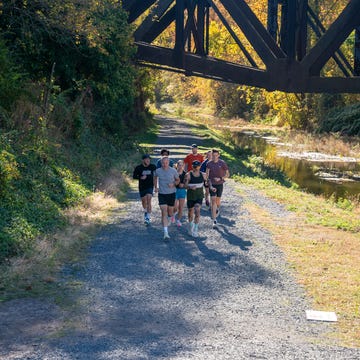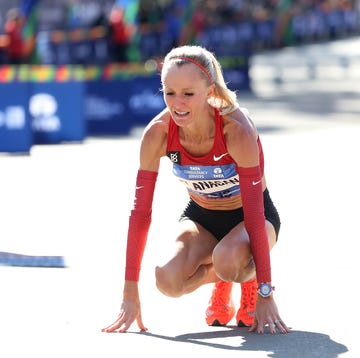Syracuse used to be a manufacturing mainstay of upstate New York, anchored by Carrier, maker of home and commercial air conditioners. Those jobs have long since moved offshore, but there's still a cool breeze emanating from the region, this time from a cross country program that's chilled off most of its competition and established itself as an assembly line of nationally ranked teams for the past four autumns.
Fayetteville-Manlius is a typical suburban high school, but the cross country teams that have emerged from it are anything but. The F-M boys, under the guidance of Bill Aris and his son John, finished second in the inaugural Nike Team Nationals in 2004, then placed third on a tie-breaker the following season. For the past two seasons, it's been the girls bearing the torch, winning the team title in 2006 and then, with an essentially different cast, repeating the feat last year, scoring 83 points to win by a record 88-point margin. But what should really make their competition shiver is the fact that six of those seven runners will return to try to make it a hat trick in 2008.
The Hornets aren't ones to rest on their laurels, however impressive. Bill Aris made that point clear the first day of summer workouts, citing the great Emil Zatopek's disdain for dwelling on past accomplishments as the team's mantra for this campaign. They know they've got great big bull's-eyes stenciled on their backs, and they take the role of two-time national champions, and the goal of making it three in a row, as seriously as any college squad.
The elder Aris, who began coaching the team as a volunteer when his job with Carrier was downsized in the early '90s, helped bring the program back to state prominence; son John, now his right-hand man in coaching the team, was a member of the Hornet squad that won the New York state championship in 1994. "Team Aris" each year has managed to take a few dozen boys and girls and mold them into one of the top teams in the region, and, for the past four years at least, the nation as well.
There's no secret or shortcut to their success -- just the time-tested recipe of "hard work and clean living," according to Bill. But the philosophies and training principles, while common sense and well accepted, are what can elevate any program a notch or two in their league, state or nation.
Based on Basics
When it comes to running, in spite of a "flavor of the month" training breakthrough, there's really very little new under the sun. "Almost everything's been around forever, just under a different name," says John. Perhaps understandably, the foundation for this success is drawn from two of the coaching titans of the sport, Percy Cerutty and Arthur Lydiard.
Indeed, the F-M boys teams have adopted the nickname of "Stotans," Cerutty's amalgam of Stoics and Spartans that embodied his own philosophy of training and living.
"Cerutty is kind of our spiritual source," says Bill. "From Lydiard, we take the physiological foundation of building a strong aerobic base through plenty of mileage."
While that may be the underlying tenet of what is arguably the most successful combined program in American high schools, the Arises haven't just come up with a rigid formula they follow year after year. "Our program is constantly evolving," says Bill. "We have some basic foundations, but we tailor it to the nature of the team we have. What works for one runner or group of runners could leave a different kid or team completely broken down."
Father and son, dedicated runners themselves, have a habit of reading "everything we can get our hands on, from the early 1900s until the present," says Bill, noting "the more diverse and possibly conflicting the better. If you only read what you agree with you're never going to grow."
When they come across a promising training idea, they're quick to try it out -- but on themselves, not their runners. "We experiment on ourselves," says John. "We're our own guinea pigs."
"Over the years we try different things," says Bill. "We keep what works and take out what doesn't."
Although their training philosophy is in a constant state of evolution (for instance, last year's girls team was very young, so the mileage was cut back compared to previous squads) there are certain constants the Hornet runners follow each year.
Other Hearst Subscriptions
"Overall, we're a strength-based program," says Bill. "Our teams usually have the slowest track times of anybody we compete against, but we do very well in cross country because of our emphasis on strength."
That aspect of training is almost unavoidable, given the topography of suburban Syracuse. "I don't think you can find a flat run around here," says John. "Even if you go out for an easy run, you're still getting strength training."
Such hilly runs are unavoidable at F-M's main training venue, Green Lakes State Park, a huge expanse of trails, almost all of them climbing hills with names like Pumphouse, Melody and Serengeti. The climbs vary in length and steepness, allowing the Arises to fine-tune the workouts to the runners' current fitness and the training effect they're trying to achieve.
However, they don't subsist solely on a diet of mountain goat climbs day after day. "You do that and you sacrifice speed and leg turnover," says Bill, noting that they'll do flatter, faster-paced running as the championship meets draw closer. "But you can't do high-quality work in the summer time and expect to run well in November and December," he adds.
As might be expected from Lydiard disciples, there's an emphasis on mileage that Bill terms "appropriate," based on the age and competitive experience of his runners. Most of the team's runs are measured in minutes rather than miles, a concession to the challenging terrain that's encountered on all but the shortest workouts.
In addition to the strength gained by running hills, the runners also do supplemental work (another bow to Cerutty), both "intensive," using weights, and "extensive," such as plyometrics and core workouts. "We believe that strength training helps prevent injury and foster running development," says Bill.
Another important element of the Hornets' success is nutrition. "We're as avid about that as we are about mileage, maybe even more so," says Bill. "It's the old saying, 'garbage in, garbage out.'"
While F-M teams have done well in indoor and outdoor track competition (the boys won the Nike Indoor 4 x 1 mile relay several years ago), the main emphasis is on cross country. That's partially by necessity, but also a conscious choice.
"This environment is very conducive to cross country but not track," says Bill. "Winter running in 20-degree weather and snow and wind just isn't conducive to good track times." But even if they lived in balmier climes or had access to an indoor track, the Arises wouldn't put much emphasis on track anyway. "You can not go flat out three seasons a year," says Bill. "You can do it physically, maybe for a few years, but kids can't do it mentally," adds John.
"We periodize our year into two seasons, cross country and outdoors," Bill continues. "And honestly, at the highest levels it's extremely difficult to have two significant seasons. I think too much track work shortens a runner's high school career. We try to put together a developmental plan and build a program around them not just for high school, but for college and beyond. We don't want our kids tapped out when they graduate from high school."
But ultimately, both Arises believe any physical training is secondary to finding athletes with an intense commitment and drive to excel. "You can look in a person's eyes and you can tell what their commitment is," says Bill. "Talent without commitment doesn't do you a lot of good, because you get to a point in training or racing and you just can't go any farther.
"We're more interested in what's in their heart and what's in their mind than in what they can do physically. We've had plenty of kids who supposedly didn't have the physical attributes, but they had a lion-hearted attitude and they'd go out and move mountains. Those are the kids you can build a program around."














